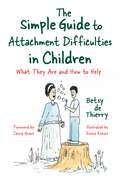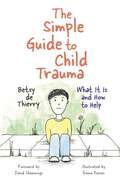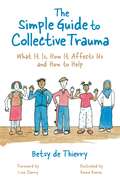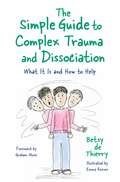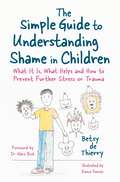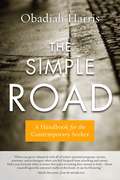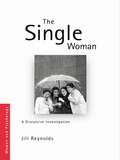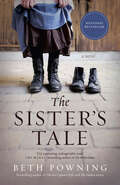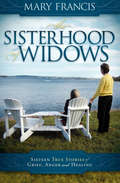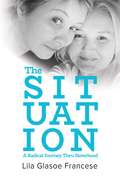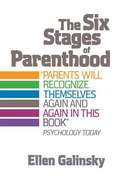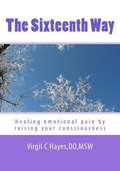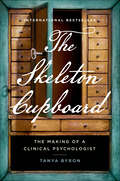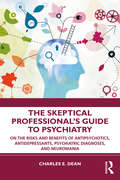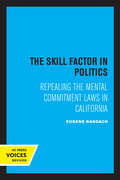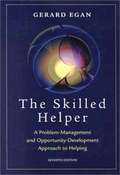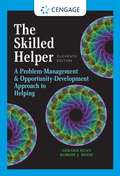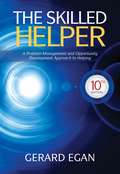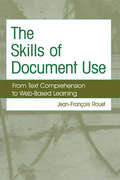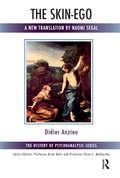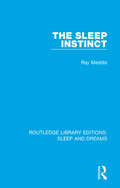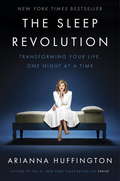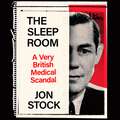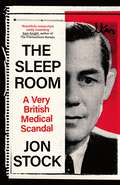- Table View
- List View
The Simple Guide to Attachment Difficulties in Children: What They Are and How to Help
by Betsy de de ThierryThe Simple Guide to Child Trauma: What It Is and How to Help
by David Shemmings Emma Reeves Betsy De Thierry· What is trauma? · How does it affect children? · How can adults help? Providing straightforward answers to these complex questions, The Simple Guide to Child Trauma is the perfect starting point for any adult caring for or working with a child who has experienced trauma. It will help them to understand more about a child's emotional and behavioural responses following trauma and provides welcome strategies to aid recovery. Reassuring advice will also rejuvenate adults' abilities to face the challenges of supporting children.
The Simple Guide to Collective Trauma: What It Is, How It Affects Us and How to Help (Simple Guides)
by Betsy de Thierry· What is collective trauma?· How can it impact children and communities?· What can we do about it?Providing accessible answers to these complex questions and more, this guide explores the key characteristics of collective trauma and provides practical advice on how to help children, young people and communities to heal.Collective trauma affects communities, families and individuals. This book highlights its impacts and with examples such as grief and loss, outlines how it can manifest. With guidance on building individual, communal and cultural resilience, this book is an invaluable resource to better understand and support children and young people dealing with collective trauma.
The Simple Guide to Complex Trauma and Dissociation: What It Is and How to Help (Simple Guides)
by Betsy de Thierry· How does complex trauma differ from trauma?· What is dissociation?· How does it affect children?· How can you help?These questions and more are answered in this guide to understanding the nature of complex trauma and dissociation, making these seemingly complicated topics accessible to all.Complex trauma and dissociation is a subject around which there is much confusion and misunderstanding. This can lead to children lacking the support they really need, and even misdiagnosis of the problems they are really struggling with. Written as a complement to The Simple Guide to Child Trauma, this book aims to inform, clarify and deepen the understanding of complex trauma and resulting dissociation. It also provides practical advice for those caring for or working with these children.
The Simple Guide to Understanding Shame in Children: What It Is, What Helps and How to Prevent Further Stress or Trauma
by Emma Reeves Betsy de de Thierry· What is shame?· How does it affect children?· How can adults help?The perfect starting point for any adult or carer working with children who have experienced shame, this guide provides straightforward answers and explanations to both common and complex questions.At a time when children are more likely than ever to experience shame, the accessible advice in this book helps adults to boost children's self-esteem. Betsy de Thierry navigates the need to understand its impact and the reasons behind it, as well as how to reduce its hold on self-confidence. Reassuring advice will also help revitalize adults' abilities to face the challenges of supporting children affected by shame. It will teach them how to restore self-esteem.
The Simple Road
by Obadiah HarrisThis elegant, concise guide by the founder of the University of Philosophical Research distills a lifetime of spiritual seeking into one beautiful, unforgettable blueprint for inner growth. "When you grow exhausted with all of today's spiritual programs, axioms, seminars, and techniques; when you feel fatigued from searching and cannot find a way forward; when it seems that years of seeking have netted so little - throw yourself upon the essential truths in this book...It can be lifesaving." --Mitch Horowitz, from the introductionFor more than a half-century, Obadiah Harris has studied the spiritual path, holding ministerial pulpits in traditions ranging from Pentecostalism to New Thought, and directing programs in continuing education, community-outreach, and distance-learning at major universities.He has worked with the ideas and legacies of spiritual icons ranging from Manly P. Hall, author of the landmark The Secret Teachings of All Ages, to Ernest Holmes, founder of the Science of Mind movement, America's most successful and intellectually rigorous New Thought congregation. When he was growing up in rural Oklahoma, Harris's family provided the first pulpit to internationally known televangelist Oral Roberts.As a scholar and seeker, Harris has traversed and helped shape broad swaths of our modern spiritual landscape. Now, he distills the insights he has found -- all of them potent, powerful, and, above all, useful -- in The Simple Road. The Simple Road is more than a book. This concise statement is a spiritual GPS that guides the earnest seeker past dead-ends and switchbacks to locate the path that most intimately and directly connect us with the Source of all life. The methods and ideas in this book can help rescue you from a crisis and provide a daily source of practice. This brave work addresses head-on topics that are often shunned or ignored in works of "proper" theology, including the question of physical healing by spiritual means -- a topic treated with deepest seriousness -- and with the existence of hostile forces that test us on the spiritual path. The Simple Road is balm for parched souls. Whatever tradition you belong to, or if you belong to no one tradition, The Simple Road helps you locate the thread of universality that runs through all faiths, and leads you to practices, prayers, methods, and parables that lift your daily journey to a higher, better place.This brief, powerful book can bring you literally life-saving solace when facing life's entanglements.From the Trade Paperback edition.
The Single Woman: A Discursive Investigation (Women and Psychology)
by Jill ReynoldsThe increase in numbers of single people has been described as one of the greatest social phenomena of western society. Most women will spend periods of their lives alone, without a committed partner relationship. Yet there is still a degree of social stigma attached to this status. Single women are a crucial group for study in relation to perceived changes in family life and relationships. This book provides a new understanding of what is often taken-for-granted – female single identity. In an examination of extracts from her interviews with women aged 30 to 60 years and living alone, Jill Reynolds explores how women deal with this potentially stigmatized identity. She focuses on identity and self-representation through consideration of discourse and the conversational moves made by the participants. Her analysis highlights that the culturally available and familiar resources for understanding singleness are highly polarized. Single women weave their way through the extreme contrasts of a denigrated or an empowered identity. Thus, while most participants give very positive accounts, they also pay attention to widespread social expectations that success in life involves a long-term committed relationship. This book makes an important contribution to the understanding of the lives of single women and represents a challenge to the considerable literature on gender and family life which has inadequately theorized singleness. It will be of great interest to academics and students in social psychology, sociology, social work and social policy. It will also be of particular interest to students of gender studies, qualitative research, narrative studies, conversation analysis and discourse analysis.
The Sinthome: The Seminar of Jacques Lacan, Book XXIII
by Jacques Lacan"Ten times, an elderly grey-haired man gets up on the stage. Ten times puffing and sighing. Ten times slowly tracing out strange multi-coloured arabesques that interweave, curling with the meanders of his speech, by turns fluid and uneasy. A whole crowd looks on, transfixed by this enigma-made-man, absorbing the ipse dixit and anticipating some illumination that is taking its time to appear. Non lucet. It’s shady in here, and the Théodores go hunting for their matches. Still, they say, cuicumque in sua arte perito credendum est, whosoever is expert in his art is to be lent credence. At what point is a person mad? The master himself poses the question. That was back in the day. Those were the mysteries of Paris forty years hence. A Dante clasping Virgil’s hand to be led through the circles of the Inferno, Lacan took the hand of James Joyce, the unreadable Irishman, and, in the wake of this slender Commander of the Faithless, made with heavy and faltering step onto the incandescent zone where symptomatic women and ravaging men burn and writhe. An equivocal troupe was in the struggling audience: his son-in-law; a dishevelled writer, young and just as unreadable back then; two dialoguing mathematicians; and a professor from Lyon vouching for the seriousness of the whole affair. A discreet Pasiphaë was being put to work backstage. Smirk then, my good fellows! Be my guest. Make fun of it all! That’s what our comic illusion is for. That way, you shall know nothing of what is happening right before your very eyes: the most carefully considered, the most lucid, and the most intrepid calling into question of the art that Freud invented, better known under its pseudonym: psychoanalysis." ―Jacques-Alain Miller
The Sister's Tale: A Novel
by Beth PowningA novel of orphans and widows, terror and hope, and the relationships that hold us together when things fall apart.With murder dominating the news, the respected wife of a New Brunswick sea captain is drawn into the case of a British home child whose bad luck has turned worse. Mortified that she must purchase the girl in a pauper auction to save her from the lechery of wealthy townsmen, Josephine Galloway finds herself suddenly the proprietor of a boarding house kept afloat by the sweat and tears of a curious and not completely compatible collection of women, including this English teenager, Flora Salford. Flora's place in her new "family" cannot be complete until she rescues the missing person in her life, the only one who understands the trials she has come through and fresh horrors met since they were separated years before.Reconnecting with characters of Beth Powning's beloved The Sea Captain's Wife, The Sister'sTale is a story of women finding their way, together, through terrible circumstances they could neither predict nor avoid, but will stop at nothing to overcome.
The Sisterhood of Widows: Sixteen True Stories of Grief, Anger and Healing
by Mary FrancisSixteen women from all walks of life share their stories of widowhood in this “wonderful collection of ‘life after loss’ experiences” (Natalie Treadwell, founder of Food for Life).When author and life coach Mary Francis found herself widowed at fifty, she turned to other widows for support, understanding, and answers. Now she shares some of the stories that helped her find a new beginning for herself in The Sisterhood of Widows.This powerful book of healing contains sixteen true stories from women who reflect on their lives after the death of their husbands. These women, whose husbands died from accidents, cancer, heart attacks, and even suicide, share their stories openly and honestly. Every widow handles loss differently, yet there is a common bond they share that makes them part of a sisterhood. And each widow’s story provides guidance and insight into the journey of perseverance through grief.
The Situation: A Radical Journey Thru Sisterhood
by Lila Glasoe FranceseThe Situation - A Radical Journey Thru Sisterhood is an intimate portrayal of two sisters, Carolyn and Lila, whose lives are deeply intertwined over forty years. "The official FDNY response time to 9/11 was five seconds. Five seconds. That’s how long it took for FDNY, for NYPD, for Port Authority, EMS to respond to an urgent need from the public. Five seconds. Hundreds died in an instant. Thousands more poured in to continue to fight for their brothers and sisters.The breathing problems started almost immediately and they were told they weren’t sick, they were crazy. And then, as the illnesses got worse, and things became more apparent, “Well, okay, you’re sick, but it’s not from the pile.” And then when the science became irrefutable, “Okay, it’s the pile, but this is a New York issue. I don’t know if we have the money.”And I’m sorry if I sound angry and undiplomatic. But I’m angry, and you should be too, and they’re all angry as well and they have every justification to be that way...Your indifference cost these men and women their most valuable commodity: time. It’s the one thing they’re running out of." - Jon Stewart's testimony before CongressJon Stewart's testimony before Congress reminded America - in scathing terms - of their responsibility to 9/11 first responders, but the effects of that day spread to nearby residents as well. Carolyn Glasoe Bailey owned an art gallery in lower Manhattan, and years later in Los Angeles, she was diagnosed with brain cancer. Her doctors told her it was mostly likely due to her proximity to Ground Zero. When Jon Stewart took to CSPAN, it moved Lila Glasoe Francese, her sister, to finally release the book she wrote about Carolyn's journey. When Carolyn is diagnosed with glioblastoma brain cancer, Lila is unaware of the complexity of the diagnosis and unprepared for the devastating path to come. When she was told she had cancer, Carolyn opted into treatment, even knowing it might change her personality. At that time, Lila went to search for a book to help her understand what her sister was going through and what her family should expect. She couldn’t find anything to support her. So she wrote the book she needed at the time to support others in their own journey.The Situation takes readers on an emotional and intense journey that explores the lifelong bond between siblings and the aching loss of deep relationship. Like When Breath Becomes Air by Paul Kalanithi and Being Mortal by Atul Gawande, it deals intimately with the choices terminal patients face, and the effect of those choices on those who love them.
The Six Stages Of Parenthood
by Ellen GalinskyAlmost all books for parents focus on the way children develop. Ellen Galinsky, instead, writes about how parents develop. Drawing on the work in adult development of Erik Erikson and Daniel Levinson, she describes six distinct stages in the life of a parent: the image-making that occurs during pregnancy; the nurturing role that swallows parents up from birth through the first couple of years; the authority parents must develop as small children show independence; the interpretive stage when parents explain the world and their values to school-age children; the interdependent stage when teenagers challenge authority; and the departure years when parents let go and take stock of their accomplishments and failures.
The Sixteenth Way: Healing Emotional Pain By Raising Your Consciousness
by Virgil C. HayesThe Sixteenth Way is a guide to a happier, healthier state of mind. Harness the power of your subconscious mind and improve your life. It is a practical approach to change your life for the better.
The Skeleton Cupboard: The Making of a Clinical Psychologist
by Tanya ByronThe gripping, unforgettable, and deeply affecting story of a young clinical psychologist learning how she can best help her patients, The Skeleton Cupboard is a riveting and revealing memoir that offers fascinating insight into the human mind. In The Skeleton Cupboard, Professor Tanya Byron recounts the stories of the patients who most influenced her career as a mental health practitioner. Spanning her years of training—years in which Byron was forced her to contend with the harsh realities of the lives of her patients and confront a dark moment in her own family's past—The Skeleton Cupboard is a compelling and compassionate account of how much health practitioners can learn from those they treat. Among others, we meet Ray, a violent sociopath desperate to be shown tenderness and compassion; Mollie, a talented teenager intent on starving herself; and Imogen, a twelve-year old so haunted by a secret that she's intent on killing herself. Byron brings the reader along as she uncovers the reasons each of these individuals behave the way they do, resulting in a thrilling, compulsively readable psychological mystery that sheds light on mental illness and what its treatment tells us about ourselves.
The Skeptical Professional’s Guide to Psychiatry: On the Risks and Benefits of Antipsychotics, Antidepressants, Psychiatric Diagnoses, and Neuromania
by Charles E. DeanThis text critically examines the shortcomings of psychiatry; the flawed development of the diagnostic system, including the DSM-5; and the failure to advance the effectiveness of antipsychotics and antidepressants. Starting with an overview of the evolution of psychiatry, Dean explores the creation, use, and misuse of medications, a process largely driven by drug companies. Other chapters describe the benefits and risks of medications, the problems associated with rational prescribing, and the embrace of so-called novel therapies including hallucinogenic drugs and opioids. Chapters end with a set of clinical notes that provide specific recommendations to clinicians, families, patients, and other providers, emphasizing the risks and benefits of treatment with medications but also stressing alternative approaches. This book will challenge clinicians to think critically about the DSM-5 and the current systems of diagnosis and treatment of mental illnesses in the hopes of ultimately improving the lives of people with mental illnesses.
The Skill Factor in Politics: Repealing the Mental Commitment Laws in California
by Eugene BardachThis title is part of UC Press's Voices Revived program, which commemorates University of California Press’s mission to seek out and cultivate the brightest minds and give them voice, reach, and impact. Drawing on a backlist dating to 1893, Voices Revived makes high-quality, peer-reviewed scholarship accessible once again using print-on-demand technology. This title was originally published in 1972.
The Skilled Helper: A Problem Management and Opportunity Development Approach to Helping
by Gerard Egan Robert ReeseTHE SKILLED HELPER has taught thousands of students a proven, step-by-step counseling process that leads to increased confidence and competence. Internationally recognized for its successful approach to effective helping, the text emphasizes the collaborative nature of the therapist-client relationship and uses a practical, three-stage framework that drives client problem-managing and opportunity-developing action. This eleventh edition emphasizes the \"power of basics,\" like decision-making skills, which are the key ingredients of successful therapy. You'll also gain a feeling for the complexity inherent in any helping relationship--but don't let that reality intimidate you. The authors show you how to adopt a helping process to the needs of your clients. You'll learn not just what you need to know and understand--but also what you need to DO to be an effective helper.
The Skilled Helper: A Problem-management And Opportunity-development Approach To Helping
by Gerard EganThis book elaborates on the communication skills needed by helpers to engage in a therapeutic dialogue with clients and a detailed overview of the problem-management and opportunity-development process at the heart of helping.
The Skills of Document Use: From Text Comprehension to Web-Based Learning
by Jean-Francois RouetThe Skills of Document Use: From Text Comprehension to Web-Based Learning examines functional literacy from a psychological standpoint. It offers a comprehensive discussion of the cognitive skills involved in reading, comprehending, and making use of complex documents. Understanding such skills is important at times when printed and online informat
The Skin-Ego: A New Translation by Naomi Segal (The History of Psychoanalysis Series)
by Didier AnzieuIn this classic work, the author presents and develops his theory of the importance of 'the Skin-ego'. Just as the skin is wrapped around the body, so the author sees the 'Skin-ego' as a psychical wrapping containing, defining and consolidating the subject. From this perspective, the structure and functions of the skin can provide psychoanalysts and general readers with a fertile and practical metaphor. The author's concept of the Skin-ego is the answer to questions he regards as crucial to contemporary psychoanalysis: questions of topography which were left incomplete by Freud; the analysis of fantasies of the container as of the contained; issues of touch between mothers and babies; extending the concept of prohibitions within an Oedipal framework to those derived from a prohibition on touching; and questions pertaining to the representation of the body and to its psychoanalytic setting. This new translation of Le Moi-peau is based on the second and last (1995) edition.
The Sleep Instinct (Routledge Library Editions: Sleep and Dreams #6)
by Ray MeddisMost of us believe that we sleep in order to rest our tired bodies and minds. Originally published in 1977, this centuries-old common-sense view is challenged by Ray Meddis, who describes and argues for a controversial new theory of the nature and function of sleep. The theory seeks to replace the old view with the idea that sleep may no longer serve any important function in modern man. Whereas the sleep instinct helps animals to survive by driving them to hide away for as long as possible each day, this is no longer a valuable asset in civilised surroundings. Nevertheless, as the author explains, we still feel driven by a primeval urge beyond conscious control to crawl away every evening to the security of our beds to wait out the dangerous hours of darkness which were such a threat to our ancestors. Contrary to contemporary wisdom, he also argues that dreaming is a primitive and particularly valueless kind of sleep – a crude a dangerous heritage from our reptilian ancestors which is kept to a bare minimum in most adult warm-blooded creatures. Ray Meddis writes in a non-technical style and succeeds admirably in making the science of sleep and intensive research studies on sleep accessible and even exciting for the general reader as well as for the scientist. He shows that not everyone is bound by a felt need for sleep; in fact, some human beings discussed at length in the book thrive on less than two hours sleep a night without any ill effects. The implications of the research described are little short of sensational; in particular, Dr Meddis believes that it is well within the bounds of possibility that future research will show us how changes can be brought about in normal people to free them from the bondage of their sleep instincts. This new perspective also leads directly into a radical reappraisal of the nature of insomnia and new possibilities for treatment.
The Sleep Revolution: Transforming Your Life, One Night at a Time
by Arianna HuffingtonWe are in the midst of a sleep deprivation crisis, writes Arianna Huffington, the co-founder and editor in chief of The Huffington Post. And this has profound consequences - on our health, our job performance, our relationships and our happiness. What is needed, she boldly asserts, is nothing short of a sleep revolution. Only by renewing our relationship with sleep can we take back control of our lives. In her bestseller Thrive, Arianna wrote about our need to redefine success through well-being, wisdom, wonder, and giving. Her discussion of the importance of sleep as a gateway to this more fulfilling way of living struck such a powerful chord that she realized the mystery and transformative power of sleep called for a fuller investigation. The result is a sweeping, scientifically rigorous, and deeply personal exploration of sleep from all angles, from the history of sleep, to the role of dreams in our lives, to the consequences of sleep deprivation, and the new golden age of sleep science that is revealing the vital role sleep plays in our every waking moment and every aspect of our health - from weight gain, diabetes, and heart disease to cancer and Alzheimer's. In The Sleep Revolution, Arianna shows how our cultural dismissal of sleep as time wasted compromises our health and our decision-making and undermines our work lives, our personal lives -- and even our sex lives. She explores all the latest science on what exactly is going on while we sleep and dream. She takes on the dangerous sleeping pill industry, and all the ways our addiction to technology disrupts our sleep. She also offers a range of recommendations and tips from leading scientists on how we can get better and more restorative sleep, and harness its incredible power. In today's fast-paced, always-connected, perpetually-harried and sleep-deprived world, our need for a good night's sleep is more important - and elusive -- than ever. The Sleep Revolution both sounds the alarm on our worldwide sleep crisis and provides a detailed road map to the great sleep awakening that can help transform our lives, our communities, and our world.From the Hardcover edition.
The Sleep Room: A Very British Medical Scandal
by Jon Stock'Shocking... a damning portrait of a man who, in the name of psychiatric progress, left a trail of broken lives in his wake' Telegraph, five stars'Compelling' Sunday Times"A gripping expose" Financial Times'A beautifully researched, wildly unsettling study of a psychiatrist running amok' Sam Knight, author of The Premonitions BureauThe Royal Waterloo Hospital, London in the 1960s. Six young women lie asleep on low beds. Day and night no longer exist, extinguished by a potent cocktail of antipsychotic, sedative and anti-depressant drugs. The women are taken from their beds by the nurses and given electroconvulsive therapy before being put to sleep again. All under the predatory eye of Dr William Sargant.THE SLEEP ROOM is a chilling exposé of Sargant's bizarre psychiatric treatments that were inflicted on hundreds of women with mental illness - among them the actor Celia Imrie. At the story's centre is a sinister and charismatic doctor, who was a hugely influential figure in post-war British society - lauded by Robert Graves and Aldous Huxley as well regularly appearing on the BBC. When Sargant died in 1988, the obituaries were glowing.But since then, women treated without their consent and with often horrific side-effects lasting decades have been campaigning to tell the truth about Sargant. Author Jon Stock tells these women's stories as well delving into the murky history of Sargant's links with the CIA and M15, both of which took a close interest in his efforts to reprogramme the human mind.As compulsive as a thriller, The Sleep Room finally gets to the truth of a scandal at the heart of the British medical establishment.'A devastating account of the effects one unchecked psychiatrist had on vulnerable mental patients.'Lisa Appignanesi, author of Mad, Bad and Sad: A History of Women and the Mind Doctors'A gripping medical biography that encompasses sex, drugs, brainwashing, intelligence operations, murder and several scandals' Frank Tallis, author of Mortal Secrets: Freud, Vienna and the Discovery of the Modern Mind'A chilling case study in dangerous psychiatry, Stock's gripping exposé of the invasive and reckless interventions inflicted on women in the Sleep Room will keep you wide awake.' Cordelia Fine, author of Patriarchy Inc. and Testosterone Rex
The Sleep Room: A Very British Medical Scandal
by Jon Stock'Shocking... a damning portrait of a man who, in the name of psychiatric progress, left a trail of broken lives in his wake' Telegraph, five stars'Compelling' Sunday Times and chosen as one of the best 80 books to take on holiday'A gripping expose' Financial Times'Lacerating' Blake Morrison, Guardian Book of the Day 'A beautifully researched, wildly unsettling study of a psychiatrist running amok' Sam Knight, author of The Premonitions Bureau"Richly sourced and admirable in its clarity about the importance of speaking to those who were treated by and knew Sargant," Dr Kate Womersley, The Lancet'Shocking investigation' The Times, chosen as a best book of 2025The Royal Waterloo Hospital, London in the 1960s. Six young women lie asleep on low beds. Day and night no longer exist, extinguished by a potent cocktail of antipsychotic, sedative and anti-depressant drugs. The women are taken from their beds by the nurses and given electroconvulsive therapy before being put to sleep again. All under the predatory eye of Dr William Sargant.THE SLEEP ROOM is a chilling exposé of Sargant's bizarre psychiatric treatments that were inflicted on hundreds of women with mental illness - among them the actor Celia Imrie. At the story's centre is a sinister and charismatic doctor, who was a hugely influential figure in post-war British society - lauded by Robert Graves and Aldous Huxley as well regularly appearing on the BBC. When Sargant died in 1988, the obituaries were glowing.But since then, women treated without their consent and with often horrific side-effects lasting decades have been campaigning to tell the truth about Sargant. Author Jon Stock tells these women's stories as well delving into the murky history of Sargant's links with the CIA and M15, both of which took a close interest in his efforts to reprogramme the human mind.As compulsive as a thriller, The Sleep Room finally gets to the truth of a scandal at the heart of the British medical establishment.'A devastating account of the effects one unchecked psychiatrist had on vulnerable mental patients.'Lisa Appignanesi, author of Mad, Bad and Sad: A History of Women and the Mind Doctors'A gripping medical biography that encompasses sex, drugs, brainwashing, intelligence operations, murder and several scandals' Frank Tallis, author of Mortal Secrets: Freud, Vienna and the Discovery of the Modern Mind'A chilling case study in dangerous psychiatry, Stock's gripping exposé of the invasive and reckless interventions inflicted on women in the Sleep Room will keep you wide awake.' Cordelia Fine, author of Patriarchy Inc. and Testosterone Rex
